The works of "AI Stefanie Sun" (AI, artificial intelligence) have a huge span, from pop, rock to "magic", and there is no genre that "AI Stefanie Sun" cannot control.

Stefanie Sun's 2000 album "The Happiness I Want".
Stefanie Sun sent a letter to respond, she said:
"The formation of a thought or opinion, a task that machines cannot replicate, that is beyond their capabilities, has loomed large and threatens thousands of jobs created by humans, such as law. , medicine, accounting, etc., and currently we are talking about, singing. The irony is that the inability of humans to surpass it is just around the corner. No one has access to such a large amount of information and can make the right choice or make the right mistake. This This new technology will be able to mass-produce everything everyone needs."
After OpenAI's (artificial intelligence research company)'s ChatGPT (an artificial intelligence chat robot) was born, worries like this emerged endlessly. If the previous Alpha Dogs, digital virtual humans, etc. were just products with a single application scenario and more gimmicks, ChatGPT, with its powerful understanding and learning ability, has broken through the existing cognition of human beings, and the scenes in science fiction movies are really coming. up. Similarly, unlike a bunch of fashionable concepts such as blockchain and metaverse, artificial intelligence now shows a clear look and intuitive application scenarios. And this singularity-like moment really requires human beings to fully think about how we should face AI and the unavoidable new century of artificial intelligence.
For human beings, the biggest nightmare is that your existence is meaningless. As Stefanie Sun said, "What do you have to argue with someone who releases a new album every few minutes?" In front of the "AI Stefanie Sun" who has unlimited possibilities, the value of her own existence seems to have become more and more dispensable, except for how powerful AI is. In the end, it may be such an "AI Stefanie Sun" "Replaced Stefanie Sun in reality.
Of course, this is still a slightly traditional case. AI still has its own body, and what is even more frightening is that it may be an AI without a real body from beginning to end, becoming a big star worshiped by thousands of people. This has been reflected in the long-ago movie "Simone" (aka "Virtual Idol"), which has a line: "Our ability to fake has now exceeded our ability to recognize falsehoods." In the future, a complete AI celebrity is also just around the corner. At that time, it will be difficult to distinguish between true and false (and now there are signs of it), and even the meaning of distinguishing between true and false will no longer exist. True is false, and false is true.

A still from "Simone" (S1m0ne, 2002).
Is there anyone who will not be replaced?
The unavoidable career destiny of individuals
Anyone who pays attention to the field of Internet technology may know that AI was in the forefront a few years ago, but because of the delay in commercial transformation, such as Ali Dharma Academy, etc., have experienced the loss of personnel. Including Baidu's layout of AI for many years, it has become more and more tasteless.
But with the emergence of ChatGPT at the end of last year, it once again detonated the AI field. Although we laugh at Baidu's Wenxin Yiyan, we have to admit that this is basically a product with the highest level and the strongest technology accumulation in China. And AI has been popular for more than half a year, and the constantly iterative GPT (a learning model) has constantly refreshed everyone's cognition and also triggered everyone's thinking about the future of mankind. Of course, the first thought of conditioned reflex is: my work Will it be replaced by AI?
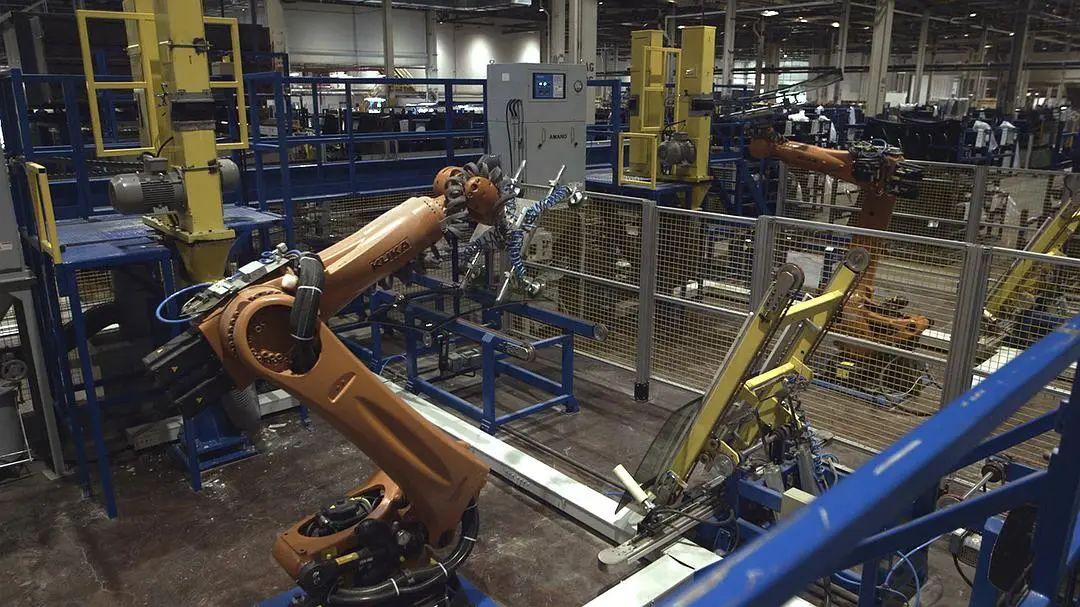
Screenshot of the documentary "American Factory" (American Factory, 2019).
Andres Oppenheimer, author of "Machine Changing the Future: How to Survive in the Age of Artificial Intelligence," analyzes news media, services, law and accounting, insurance and banking, healthcare, education, manufacturing and entertainment, etc. He believes that 47% of existing jobs are at risk of being eliminated by robots, artificial intelligence or other technologies in the next 20 years.
Only 47%, I think this is too optimistic. Unlike the previous informatization and mechanization, the previous impact was repetitive, single, and standardized manual labor/simple labor. The work of white-collar workers or intellectuals (self-proclaimed "creative work") was not affected, but this time it was completely reversed. On the contrary, the blue-collar workers were spared, while the so-called "creative jobs" and seemingly high-end legal, medical, insurance and finance, etc., were the hardest hit areas.
Jeff Colvin, author of "People Who Will Not Be Replaced by Machines: Survival Strategies in the Age of Intelligence", is also more optimistic. He believes that this is an opportunity to shift from knowledge workers to relational workers:
Over the past three hundred years, economic development has required more technical skills that workers have learned in the classroom and are associated with left-brain functions. In the future, these skills will no longer be the most valuable skills, although they will be Still important, but important does not mean valuable. Skills are being commoditized and thus no longer constitute a competitive advantage. New high-value skills will emerge from essential human attributes. These are the skills that are uniquely human: perceiving the thoughts and emotions of others, working in teams, building relationships, solving problems together, expressing ourselves more effectively than logically, and these skills are fundamental to those that were valuable in past economic developments. difference.
Unlike previous transformations, this one will not only bring financial rewards to our working lives, but will also enrich our emotions and make us more joyful. …Relational workers are gradually becoming the most valuable people. The general trend is that the number of jobs has increased substantially in all industries that involve human interaction. Computers will eat human work, but we should be happy because it allows people to do what they are supposed to do.
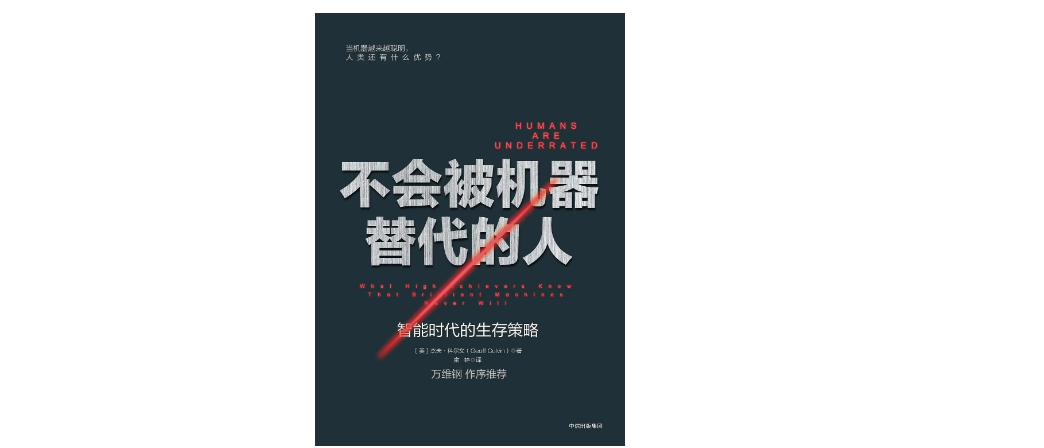
"People Who Will Not Be Replaced by Machines: Survival Strategies in the Age of Intelligence", [US] Jeff Colvin, translated by Yu Ting, CITIC Publishing House, October 2017.
But I think this way of thinking may still have erroneous thinking under anthropocentrism, because its premise is that AI in the intelligent age will not have emotions and emotions-this is now with the continuous iteration of GPT, which has produced a terrifying autonomy. Of course, as far as the current reality is concerned, many people think that educational and companionship work is irreplaceable. This is actually self-support. The fact that educational work has been replaced has been practiced during the three-year epidemic; as for companionship Products such as "Tmall Genie" may solve the problem of emotional companionship; while physical robot care, it is not a big problem to solve patients and elderly care in the future. Some people say that the doctor with the longest learning period, especially the doctor who performs surgery? This is also naive. Just think about how many doctors now would not see a doctor without mechanical equipment testing and filming?
Therefore, Jerry Kaplan, a top artificial intelligence expert at Stanford University, put forward more radically in "The Age of Artificial Intelligence: The Future of Wealth, Work, and Thinking under Human-Machine Coexistence": "No matter what color your collar is, the machine will never forget it." Show mercy... When the self-awareness of artificial people is gradually awakened, human beings are just creatures they keep in captivity." He draws an analogy: Our highways are killing animals because they don't detect a two-ton metal threat roaring down the road. Likewise, we don't even have the words to discuss the upcoming technological change. Taken together, we are in danger of being killed on the so-called information superhighway. Nothing seems irreplaceable. Although we are all worried, this trend is indeed unstoppable, and the pace of human beings sending themselves to the grave is accelerating.
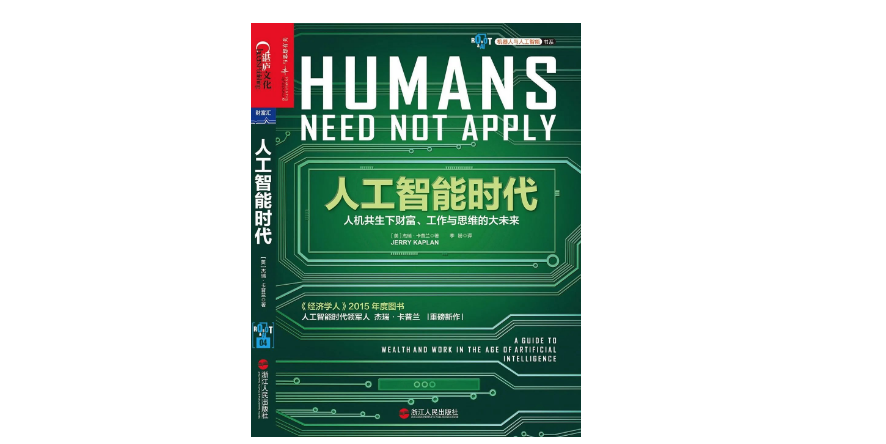
"The Era of Artificial Intelligence: The Great Future of Wealth, Work and Thinking Under Human-Machine Coexistence", [US] Jerry Kaplan, translated by Li Pan, Zhejiang People's Publishing House Zhanlu Culture, April 2016.
Of course, there is always a way to survive. John Pugliano, author of "The Robots Are Coming: The Laws of Human Survival in the Age of Artificial Intelligence," gives advice: If you want to have an advantage in the automation competition, how should you make the most of it? Uniquely human traits: creativity, ingenuity, and entrepreneurship. Winning this battle cannot be by physical strength, but by the way of thinking. This book attempts to summarize four principles of thinking designed to help guide us through the turbulent economic times brought about by ubiquitous automation.
First, think like a human, not like a machine. Your economic value is determined by your creativity, not by your ability to perform repetitive tasks. Develop the human touch skills unique to your individual talents and abilities, with an emphasis on creativity. Second, think like an entrepreneur, not an employee. Unemployment will spread like an epidemic as people are replaced by more efficient machines. There may not be many jobs, but there will still be plenty of opportunities for those who learn to cash in on their human touch. Third, think like a saver, not a consumer. The focus on automation to produce more efficiently creates a deflationary environment in which prices fall. Deflation favors savers with self-control and delayed gratification. Consumers shop for emotional gratification, while savers recognize value and buy value-added products. Fourth, think like an investor, not a speculator. The creative destruction of technology will obsolete many established industries, creating amazing investment opportunities. Filtering the froth of media hype is a key skill in protecting capital. Prudent investors will find plenty of ways to expand their fortunes.
Civilization will also be "no one spared"?
Risks and Principles
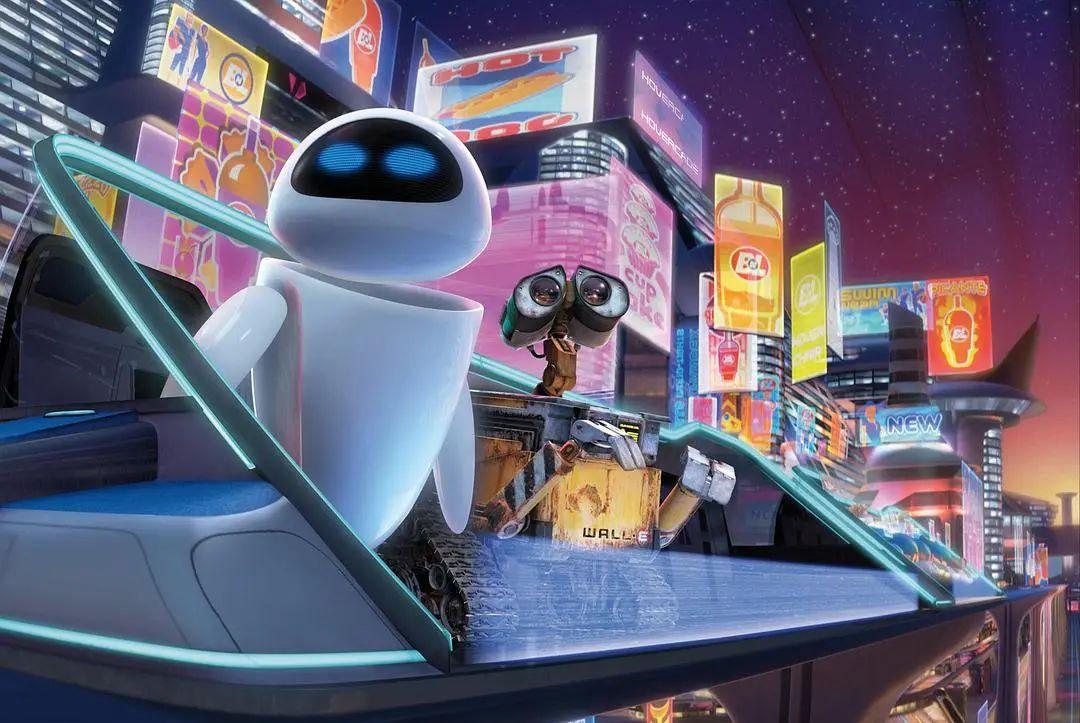
Screenshot of "Robot Story" (WALL·E, 2008).
Although all the public is concerned about the crisis at the personal and professional level, this is actually only the most superficial part of the risk of AI. The real risk is that it systematically poses a challenge to human civilization. It is also based on this that gradually there is a voice of reflection and opposition.
On March 30, Elon Musk, the co-founder of OpenAI, and a group of artificial intelligence experts and industry executives called in an open letter to suspend the training of the GPT model in the next six months to prevent the model from becoming more powerful. , thus causing potential risks to society and human beings. "More powerful AI systems can only be developed if we are confident that their effects are positive and their risks manageable," the joint letter said.
The letter, issued by the nonprofit Future of Life Institute, was signed by more than 1,000 people, including Musk, Stability AI (artificial intelligence enterprise) CEO Emad Mostaque, Google's Researchers at DeepMind (artificial intelligence enterprise), as well as heavyweights in the field of artificial intelligence, such as Yoshua Bengio and Stuart Russell. They call for shared security protocols developed, implemented, and vetted by independent experts for such large models before GPT becomes more powerful.
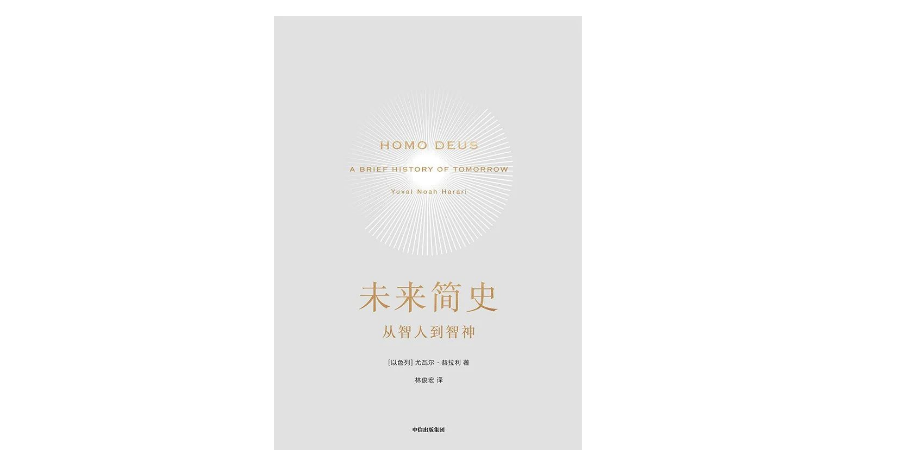
A Brief History of the Future: From Homo sapiens to Homo sapiens, written by Yuval Harari, translated by Lin Junhong, CITIC Publishing House, February 2017.
At the beginning of May this year, Israeli historian Yuval Noah Harari wrote about the relationship between artificial intelligence and human beings. He believed that "new artificial intelligence tools have emerged, threatening the survival of human civilization from an unexpected direction. .AI has acquired some remarkable abilities to manipulate and generate language, whether in words, sounds, or images. Thus, AI has invaded the operating system of our civilization."
Nick Bostrom, dean of the Institute for the Future of Humanity at the University of Oxford, made a systematic analysis of humans and superintelligence in "Superintelligence: Roadmap, Dangers and Coping Strategies". He said, "If machines are smarter than humans, then We will no longer be masters of this planet. When this happens, machines will outperform humans."
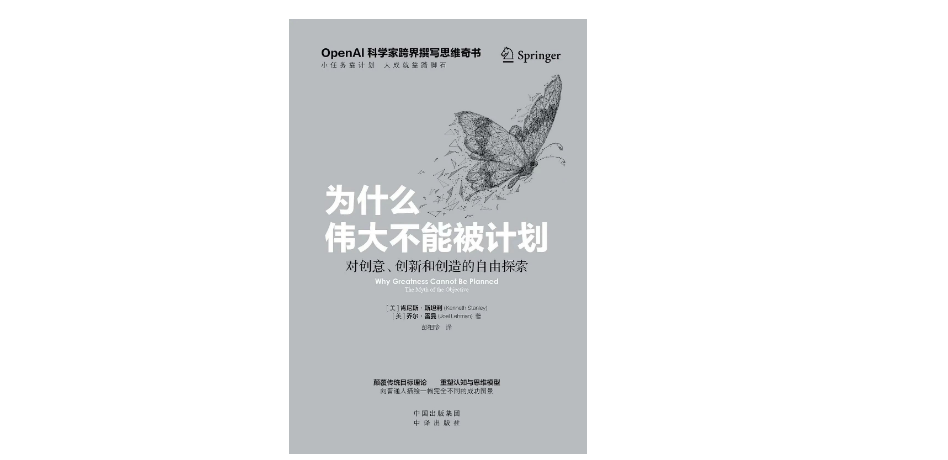
"Why Greatness Cannot Be Planned: A Free Exploration of Ideas, Innovation, and Creation", by [US] Kenneth Stanley, [US] Joel Lehman, translated by Peng Xiangzhen, China Translation Press, April 2023.
These concerns are not pretentious. Joel Lehman, one of the authors of "Why Greatness Cannot Be Planned: A Freedom to Explore Ideas, Innovation, and Creation," as an OpenAI researcher, published an article " "Magic" paper, for the first time revealed a research of OpenAI: the large model learns by itself, writes the code by itself, and then "tunes" an intelligent robot by itself. This also reveals that the code generation ability of large models is enough to affect the evolution of AI, and this progress can in turn enhance the generation ability of large models. In other words, intelligence can learn and evolve on its own. The criticism of the "goal" and "plan" in the book, combined with the GPT results they achieved after breaking the rules, is even more worrying about the "technical explosion" behind it.
"The Ultimate Destiny of Humanity: From the Paleolithic Age to the Future of Artificial Intelligence" discusses the self-awareness of intelligence in a philosophical way. Zakadakis said in his work, "Self-awareness is the deepest and most mysterious element in human consciousness....Self-awareness is not only our salvation, but also an investment in logic, mathematics, computer science and artificial intelligence. bomb. It thinks the mind has the ability to observe itself."
Finally, on May 30, two months after the announcement of the open letter led by Musk, 350 AI authorities, including "Father of ChatGPT" Sam Altman (Sam Altman), signed a new joint open letter, And worry that the AI technology currently under development may pose an existential threat to human beings. The letter consists of a single statement: Reducing the risk of AI extinction should be a global priority along with other societal-scale risks such as pandemics and nuclear war.
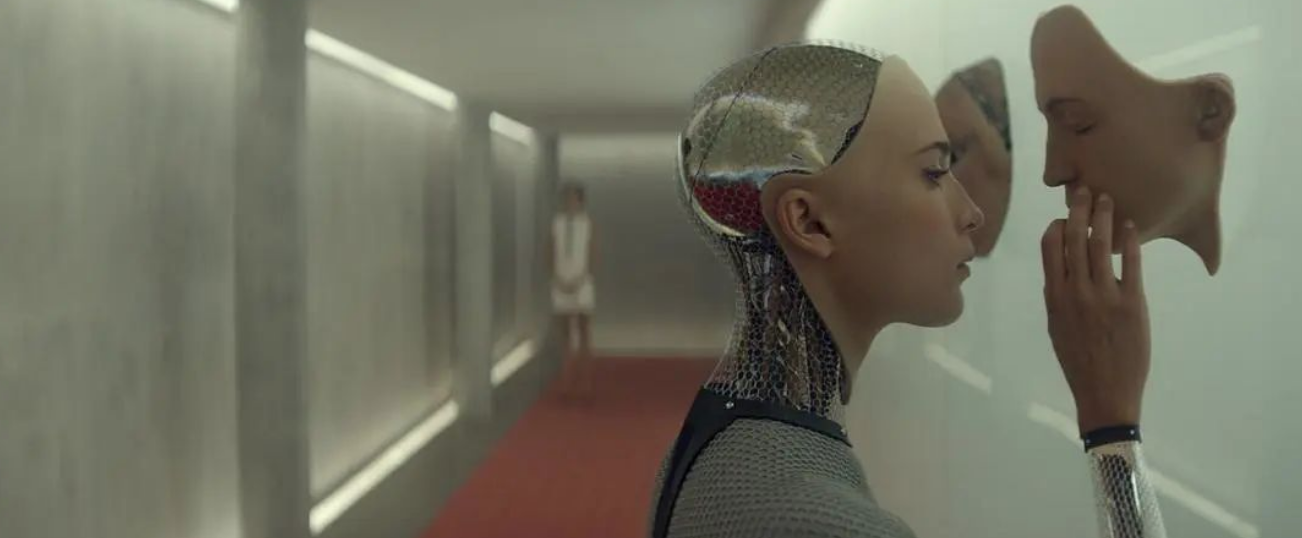
A still from Ex Machina (2014).
Science fiction fans know the three principles of robots, namely, the first: a robot must not injure a human being, or stand idly by when a human being is harmed; the second: a robot must obey a human's order, unless the order contradicts the first; Article 3: A robot must protect itself, unless such protection contradicts the above two. This is a stipulation for robots proposed by the science fiction writer Asimov in 1940 to protect human beings. In the same way, we have to think, what principles do we need to protect human beings and civilization in the era of AI intelligence?
Fukuda Masaki, one of the authors of "AI Connected Society: Ethics and Law in the Era of Artificial Intelligence Networking", imagined an "Intelligent Connected Society", in which human beings can take themselves as the main body and coexist with AI networks. AI network can freely and safely create, exchange, and connect various data, information, and knowledge to form a "smart network", so that people, things, and things in various fields can further coordinate and cooperate beyond space, so as to be more creative and more intelligent. dynamic development. The so-called "intelligently connected society" is just such a human-centered social state.
In order to form such a "Smart Connected Society", the author puts forward eight basic principles that we need to follow, among which the representative ones are: all people can benefit; guarantee individual autonomy and human dignity; guarantee the continuation of innovative research and development and fair competition; taking into account both the virtual world and the real world. In short, people-oriented is the bottom line principle of AI society. This point is also consistent with the theoretical research work "Society 5.0: Human-Centered Super Intelligent Society" of Hitachi East University Laboratory. It is mentioned in the book that from a core point of view, the main line of "Society 5.0" is people, that is, people-centered, improving the degree of humanity, more respect for humanity, and more respect for freedom. Correspondingly, there are improvements in energy, medical care, work, Comfort in all aspects of life such as education, transportation, shopping, entertainment, etc., transforming into a more inclusive society.
"Will finally sail into the stars of the universe"
Regardless of the era of artificial intelligence, or the "Society 5.0" discussed in "The Fifth Social Wave: Future of Industry, Technology, Methods and Tools" from hunter-gatherer society, agricultural society, industrial society and information society to the present, its The driving force behind it is the continuous improvement of internal technology. The development of these different eras is accompanied by the rapid increase in production efficiency and the gradual liberation of productivity. People have truly felt the progress brought about by technology. But there are different forks in the direction: Pursue a virtual and intelligent metaverse, or a vast and mysterious real universe?
Liu Cixin, a Chinese science fiction writer and author of the "Three-Body" series, believes that we are increasingly becoming a very introverted civilization, rather than a civilization that expands and explores outwards. However, information technology develops at an unimaginable speed, and the network covers the whole world. In the increasingly comfortable comfort zone created by IT, people gradually lose interest in space. Compared with the real space exploration full of dangers, they prefer Willing to experience virtual space in VR. It's like a saying: "You promised me the stars and the sea, but you only gave me Facebook (social media)." He believes that the boundless space is still the best destination and destination for human imagination; The future is all bleak.
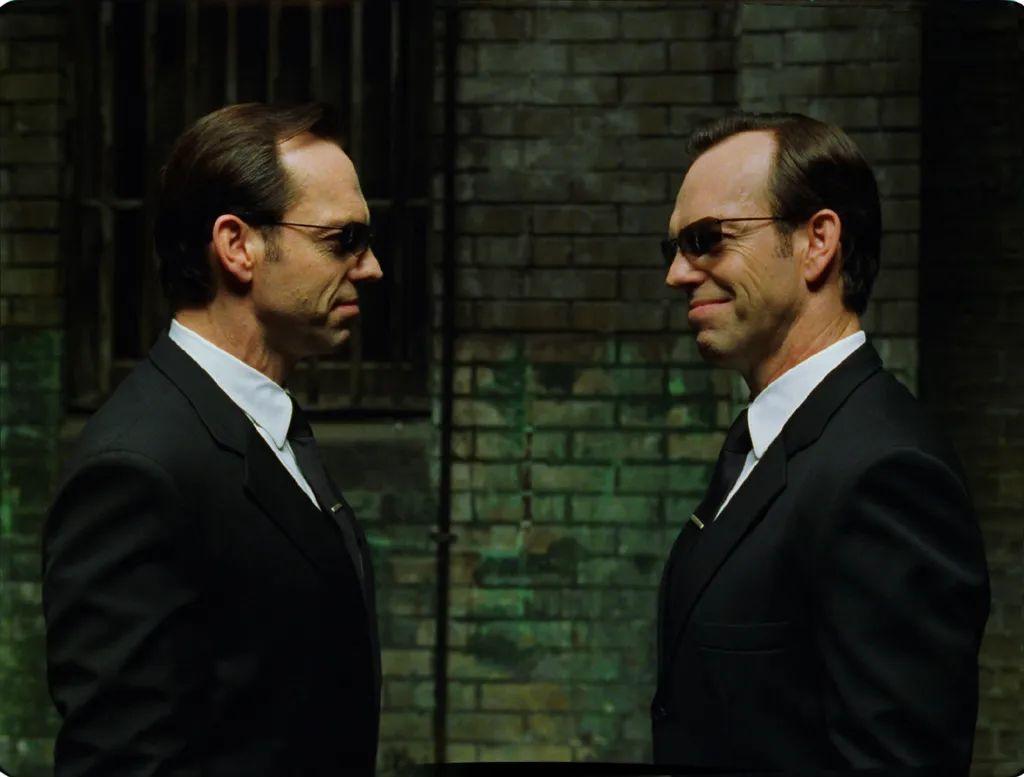
"The Matrix Reloaded, 2003" stills.
Of course, it is not to say that artificial intelligence and space exploration are contradictory. In "Life 3.0: Human Evolution and Rebirth in the Era of Artificial Intelligence" by Max Tegmark This is combined in the chapter "And Beyond" to show a beautiful picture of the future of mankind: if our current artificial intelligence progress triggers an intelligence explosion that eventually allows us to colonize the universe, then this intelligence explosion has a cosmic level of real Significance: For billions of years, in this indifferent and barren universe, life has only stirred up tiny waves, but this explosion suddenly made life explode on the stage of the universe with a spherical shock wave that expands at near light speed and never stops , this shock wave ignited everything in its path with the spark of life. …Super intelligent life can not only use the existing resources more effectively, but also colonize the universe at the speed of light to obtain more resources, thereby increasing the existing biosphere by about 32 orders of magnitude.
Entering the 21st century, compared with the lively moon landing and interstellar exploration in the last century, many people may have forgotten about space exploration. Only when some hot spots such as the launch of the Shenzhou series of spacecraft will they look up at the starry sky. In fact, the civilian use of aviation technology in the last century was also one of the important factors promoting the information revolution. In the future, space technology may lead the development of mankind.

"The Fifth Industrial Revolution: Technological Revolution and Industrial Transformation Caused by Space Technology", written by [West] Inma Martinez, translated by Gong Ruoqing, Tiandi Publishing House, October 2021.
Inma Martínez, a Spanish female scientist, showed us the beautiful imagination of the future of space. She focused on the development of space technology in "The Fifth Industrial Revolution: Technological Revolution and Industrial Transformation Caused by Space Technology", showing readers the The drastic changes that may occur in the space industry in the next fifty years will make more people look up at the stars again. After summarizing the history of the first four industrial revolutions, she expects that the upcoming fifth industrial revolution led by space technology will bring mankind into a new era of "space civilization". In the next 5-10 years, space travel will become a reality. Human beings are preliminarily ready for the fifth industrial revolution. You and I may fly to space in our lifetime and become the first generation of space residents.
Get excited just thinking about it! Indeed, compared to worrying about being robbed of my job by AI and indulging in the virtual metaverse every day, I also like the vast and empty space, which is the sea of stars that makes human beings more excited. As Inma Martinez said, "human beings Born in the stars of the universe, and will eventually sail into the stars of the universe", I think this should be the best destination for human beings.
Author/Zhang Tianpan (Practitioner in Technology Industry)
Edit / Luo Dong
Proofreading / Liu Jun
Articles are uploaded by users and are for non-commercial browsing only. Posted by: Lomu, please indicate the source: https://www.daogebangong.com/en/articles/detail/Stefanie%20Sun%20also%20accepted%20her%20fate%20will%20we%20all%20lose%20our%20uniqueness%20eventually.html

 支付宝扫一扫
支付宝扫一扫 
评论列表(196条)
测试